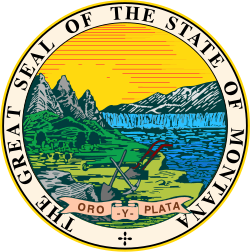| ||||||||||||||||||||
| Turnout | 75.00% | |||||||||||||||||||
|---|---|---|---|---|---|---|---|---|---|---|---|---|---|---|---|---|---|---|---|---|
| ||||||||||||||||||||
Schwinden: 50–60% 60–70% 70–80% 80–90% | ||||||||||||||||||||
| ||||||||||||||||||||
| Elections in Montana |
|---|
 |
The 1984 Montana gubernatorial election took place on November 6, 1984. Incumbent Governor of Montana Ted Schwinden, who was first elected in 1980, ran for re-election. Schwinden won the Democratic primary against a perennial candidate, and moved on to the general election, where he faced Pat M. Goodover, a State Senator and the Republican nominee. Although then-President Ronald Reagan won the state in a landslide that year in the presidential election, Schwinden defeated Goodover with over 70% of the vote to win his second and final term as governor. This was the last time that Democrats won a gubernatorial election in Montana until 2004.



